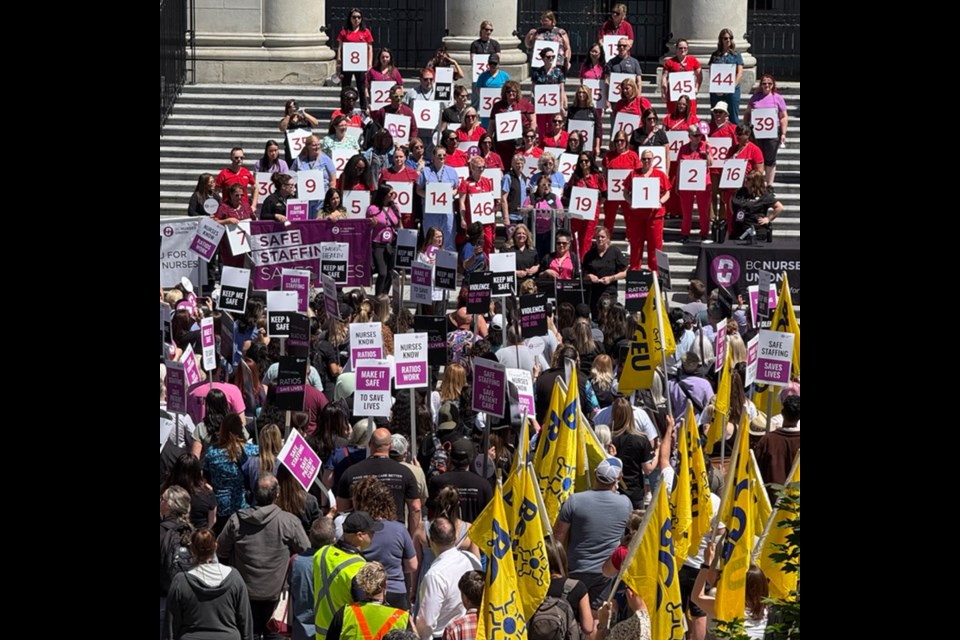Nurses from across British Columbia — including 26 from the Northern Health region — gathered in Vancouver on Thursday, May 28 to rally against a rise in workplace violence in hospitals across the country.
The rally, organized by the BC Nurses’ Union (BCNU), brought together more than 500 nurses under the banner “Violence. Not Part of the Job.”
Participants aimed to raise awareness about rising incidents of violence, chronic understaffing, and what they say is a lack of security measures to protect health-care workers.
Also in attendance were representatives from the BC General Employees’ Union (BCGEU), Health Sciences Association (HSA), Canadian Federation of Nurses Unions, and National Nurses United (California).
“It probably was the best rally that I've ever attended. It was so powerful,” said Danette Thomsen, North East Regional Council member. “People are just done — nurses are done. It was really nice to be joined by our colleagues from the BCGEU and the Health Sciences Association as well.”
Thomsen told The Citizen that in less than a decade, the number of nurses injured each month due to workplace violence has nearly doubled.
“Our work safety statistics back in 2014 showed an average of 25 nurses per month were off due to injuries from violence. In 2023, that's up to 46,” she said. “We are already facing a shortage — if you're removing 46 nurses a month, do the math. This cannot go on.”
She said long wait times and staff shortages have contributed to the escalation in violence.
One story shared at the rally deeply affected Thomsen and highlighted how serious the problem has become.
“A nurse from Surrey Memorial spoke at the rally. She holds a master’s degree,” Thomsen said. “She was just helping a patient who had vomited on himself, trying to clean him up. For no reason, he began punching her repeatedly in the head. She now has a severe brain injury and can no longer work. It was heartbreaking to hear her story — and it’s not an isolated case. This is happening everywhere.”
Thomsen also shared her own experience with workplace violence, saying a patient once squeezed her hands so hard he damaged the tendon casing, leaving her unable to work for four months. She continues to deal with complications today.
“These experiences are not unique,” she said. “Nurses face similar incidents every day.”
“In Northern Health, we did a survey last year. Fifty-four per cent of nurses said they had experienced physical violence, 85 per cent reported verbal or emotional abuse, 50 per cent had been exposed to weapons, and 72 per cent reported exposure to illicit drug use,” said Thomsen. “Last year, the government introduced some changes, but the health authority still needs to step up. We want to care for everyone, but nurses have to be safe too.”
Thomsen said stricter enforcement is needed.
“You can’t come in and light up fentanyl or crack and expose not just the nurses, but everyone else too,” she said. “We heard from Quesnel that a four-hour-old baby was exposed to fentanyl smoke from another patient. That’s unacceptable.”
With the BCNU entering contract negotiations this year, Thomsen said she hopes change is coming.
“We're entering bargaining this year,” she said. “Our contract is up, and the employer has the same responsibility as any other employer — to keep their workers safe. That’s just not happening. Nurses feel unsafe, disrespected and unsupported when they report these incidents. Worse, many don’t even report them anymore, because nothing happens. Nothing changes. That’s not OK.”
Thomsen believes solutions exist, but require addressing systemic issues.
“I think we need to pressure the health authority to implement nurse-patient ratios,” she said. “It won't fix everything, but it will absolutely help. When we have enough nurses on the floor, it’s safer for everyone. That will also stop the exodus from nursing. Nurses need to feel safe at work and be able to go home at the end of the day proud of the care they’ve provided.”
The Citizen reached out to the Ministry of Health for comment and received the following statement from Health Minister Josie Osborne:
“Violence has absolutely no place in any workplace, including the hospitals and health-care facilities where people go to get help and support to feel better. Ensuring hospitals are safe for staff and patients is a top priority of our government.
“That’s why we’ve hired 780 relational security officers in the past three years. These officers have specialized training to prevent and respond to violent situations in hospitals, and results show they have been effective in reducing violent incidents and WorkSafeBC claims.
“We are also working to strengthen our policies and procedures to keep weapons out of hospitals. I’ve directed ministry staff to examine the feasibility of implementing AI weapons detection technology in emergency rooms — something many hospitals across Canada are considering. We are also looking at ways to better identify individuals known to be at high risk of violence, and to ensure this is flagged for frontline workers.
“While BC has had the fastest-growing nursing workforce of any major province and has hired more than 7,500 nurses since 2017, we are now moving forward with minimum nurse-to-patient ratios — the first jurisdiction in Canada to do so. We know this is the right thing to do. It will mean better care for patients and safer working environments for nurses.”



